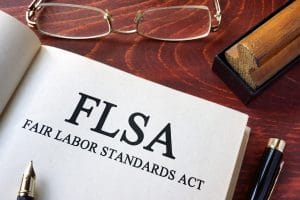What Is the Fair Labor Standards Act?
 If you’re employed, then you know that there are certain rules and regulations that your employer has to follow in order to employ you legally. The Fair Labor Standards Act (FLSA) is what ensures those rules and regulations are followed. Before the FLSA was passed in 1938, children were working in factories, workers were vastly underpaid, their working environments were unnecessarily dangerous, and the workers were overworked; but now, you have certain rights and there are certain standards in place that allow you certain rights as a worker.
If you’re employed, then you know that there are certain rules and regulations that your employer has to follow in order to employ you legally. The Fair Labor Standards Act (FLSA) is what ensures those rules and regulations are followed. Before the FLSA was passed in 1938, children were working in factories, workers were vastly underpaid, their working environments were unnecessarily dangerous, and the workers were overworked; but now, you have certain rights and there are certain standards in place that allow you certain rights as a worker.
The FLSA “establishes minimum wage, overtime pay, recordkeeping, and child labor standards affecting full-time and part-time workers in the private sector and in Federal, State, and local governments.” The act has been amended as recently as 2009 when workers were given the new standard minimum wage of $7.25 per hour.
What doesn’t the FLSA regulate?
There are several requirements for employers that are held within the FLSA. Minimum wage, overtime pay, and the employment of children are all items regulated by the FLSA, but what isn’t covered by this act?
- Your job does not need to offer you vacation, holiday, severance, or sick pay;
- Your job is not required to offer you a meal or rest periods, holidays off, or vacations;
- The FLSA does not regulate premium pay for weekend or holiday work;
- Your employer is not required to give raises or fringe benefits; and
- Your employer does not need to give you a termination notice, reason for termination, or immediate payment of final wages to discharged employees.
Some states have laws in place that do require such things, but it not mandated under the federal government.
Am I covered under the FLSA?
There’s a wide array of people covered under the FLSA. The US Department of Labor states:
All employees of certain enterprises having workers engaged in interstate commerce, producing goods for interstate commerce, or handling, selling, or otherwise working on goods or materials that have been moved in or produced for such commerce by any person, are covered by the FLSA. A covered enterprise is the related activities performed through unified operation or common control by any person or persons for a common business purpose and —
- whose annual gross volume of sales made or business done is not less than $500,000 (exclusive of excise taxes at the retail level that are separately stated); or
- is engaged in the operation of a hospital, an institution primarily engaged in the care of the sick, the aged, or the mentally ill who reside on the premises; a school for mentally or physically disabled or gifted children; a preschool, an elementary or secondary school, or an institution of higher education (whether operated for profit or not for profit); or
- is an activity of a public agency.
Certain groups of workers, therefore, are exempt from these regulations. Generally speaking, they include:
- Executives
- Administrators
- Professionals
- Outside sales personnel
- IT professionals
There are “tests” to determine which workers would fall into each category.
What happens if my employer violates the FLSA?
Let’s say that your employer doesn’t pay you the correct wages or that they hire someone underage, what happens then? Those who knowingly and willfully violate these rules are subject to fines and even imprisonment.
Employers who infringe on your minimum wage or your overtime payments may have to pay up to $1,000 in fines for each violation. If they break the child labor law provisions, your employer may owe up to $10,000 in fines per violation. These willful violations of the FLSA could subject your employer to civil liability as well as criminal charges, plus fines up to $10,000 per violation. A second breach could land your employer in prison.
Can I file a lawsuit against my employer for an FLSA violation?
It depends on the violation. In cases involving unpaid wages, for example, you may need to file a wage claim with the U.S. Department of Labor before you file a lawsuit, to show you have gone through all the administrative steps to get your fair pay.
If the wage claim does not work, however, you may be able to file a civil lawsuit for breach of contract. The terms of your employment are laid out in your contract. If your employer fails to follow the contract, or has included terms which violate the FLSA, you may be able to file a lawsuit for damages.
Employees and workers who are exempt from FLSA regulations may have no option but civil litigation.
A fair minimum wage, overtime pay requirements, restrictions for young workers and more are all regulated under the Fair Labor Standards Act. If you’re ever taken advantage of by your employer, and they break one of these regulations, then you may file a claim against them for damages. If you need legal representation in acting against your employer for a FLSA violation, then contact Grable Grimshaw PLLC at 210-963-5297 or fill out our contact form to schedule an appointment with us at our San Antonio office.
